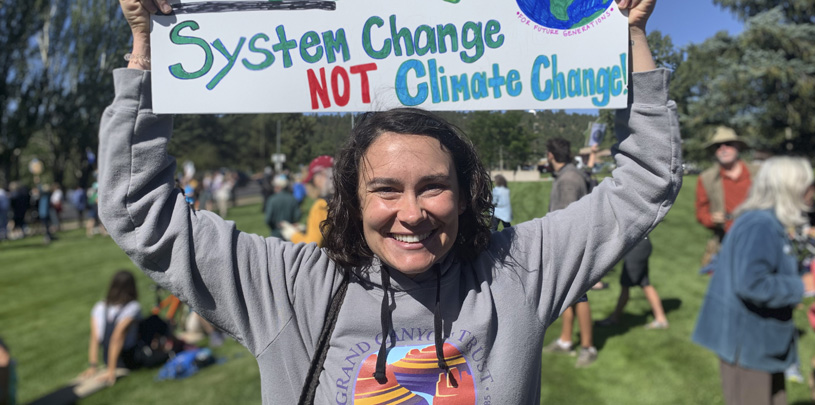
 by Lisa Winters, Research and Stewardship Volunteer Coordinator
by Lisa Winters, Research and Stewardship Volunteer Coordinator
Do you have climate-science deniers in your family? Do you clash about politics often? If you’re like me, the holidays can be awkward or even downright painful as you bite your tongue to avoid disagreements. But however appealing it might seem, surrounding yourself with people who agree with you 100 percent of the time doesn't stop climate change. Seven in 10 Americans believe climate change is happening, but more than two thirds rarely talk about it. Looking for a way to make a difference? It’s time to talk about it!

Weather refers to short-term changes: Is it going to rain today? Will it be sunny this weekend?
On the other hand, climate describes the weather over long periods of time. Our climate is changing at an alarming rate. We've seen atmospheric carbon dioxide increase drastically in the last 100 years, due largely to the burning of fossil fuels. During this time, the planet’s average surface temperature has risen about 1.6 degrees Farenheit. The oceans have absorbed this heat, ice sheets are shrinking, glaciers are melting, sea levels are rising (eight inches in the last century), and locally, the Southwest will see increasing heat, drought, and wildfires.
Ease into the topic with a lighthearted conversation about this year’s best backyard bird and wildlife sightings. Surprised at how early in the year you saw hummingbirds? Noticed blooming daffodils before you even packed away that winter jacket? Set out water during that dry spell when the deer started visiting your yard? These are all subtle signs that the climate is changing. Birds lay eggs earlier in the year, plants bloom earlier, and mammals come out of hibernation sooner. By starting from a tangible place, like recalling our own backyard observations, it’s easier to feel connected to what is happening in the environment around you.

Now, it’s time to convince those stubborn family members that it matters. Earlier this month, over 11,000 scientists announced that our changing climate constitutes a global emergency. But our skeptical family members might not heed these alarm bells. To bring them around, ask about their favorite outdoor activities or latest travels. The hunting, fishing, mountain biking, camping, or hiking that brings them joy is likely taking place on public lands.
Recreation is a major “use” of our public lands, owned by each and every one of us — but so is oil and gas development. In a big win for the climate, Navajo Generating Station, the largest coal power plant the western United States and third-largest carbon emitter in the United States, shut down earlier this month due to the rising economic cost of burning coal. Renewable energy is becoming more popular as technology improves, capacity for storage increases, and costs decrease.
Once you’ve established that climate change matters on a personal level to those around you, help them understand the small steps they can take to make a difference in their community.
Whatever you do this holiday season, set a good example for those around you. If the conversation gets heated (get it?), diffuse the situation with a well-placed joke. Here's one to tuck up your sleeve: “If we need to lower the temperature drastically, we can just switch from Fahrenheit to Celsius, right?”.
Of course, if you’re still not getting through to your family member or friend, you can always send them our way. Gift memberships to the Grand Canyon Trust start at just $50 and are a great holiday buy!
And remember: we’re all in this together. Thank you for doing your part and happy holidays!
Did you know the Colorado River used to be called the Grand River? Learn about the name change and more fun facts about this hardworking river.
Read MoreChallenging conditions have endangered, threatened, or imperiled these five native fish in the Grand Canyon.
Read MoreBeneath the bathtub ring at Lake Powell, native plants are flourishing, cultural sites are resurfacing, and whitewater rapids are returning.
Read More